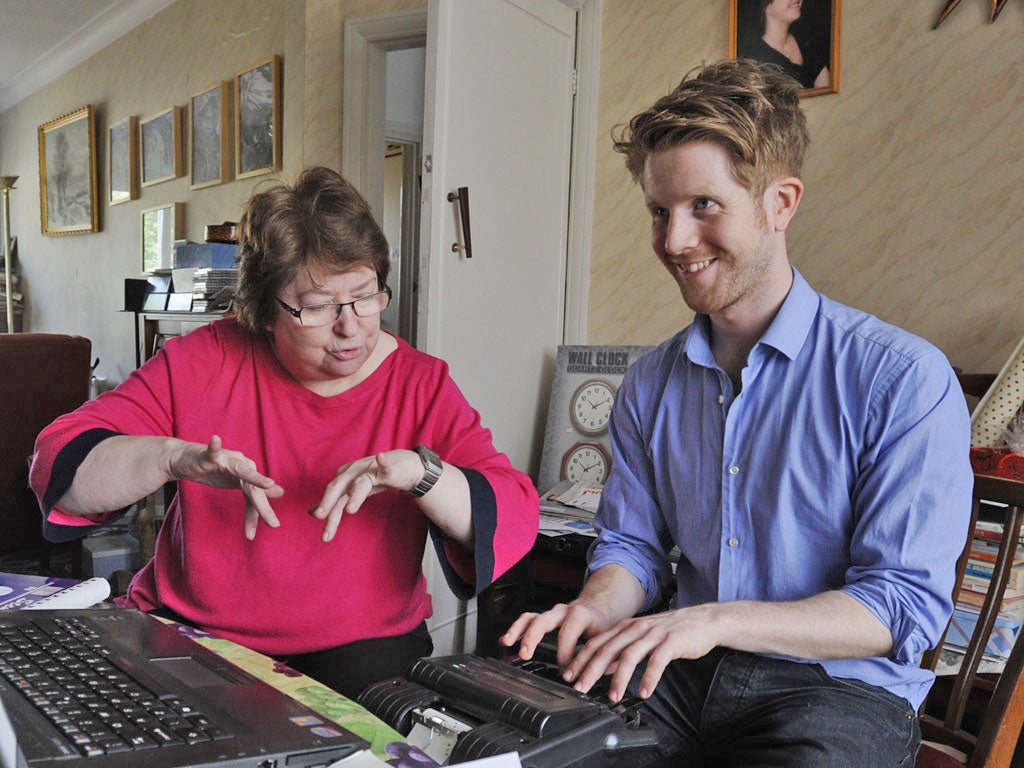Art of court stenographer faces the final sentence
Charlie Cooper discovers what we’ll lose when the law enters the digital age

Staring down at the keys of a stenography machine is – for the uninitiated – baffling. For a start, the last time I checked there were 26 letters in the alphabet. There are only 22 keys on this thing.
My teacher, Mary Sorene, said, not altogether encouragingly: "It's a bit like having to learn a musical instrument and a new language at the same time."
Mrs Sorene, a veteran stenographer who cut her teeth as a court logger in the cauldron-like atmosphere of the Old Bailey, explained that you don't tap at stenotype keys, you "stroke" them.
She showed me how a single flashing hand could spell out syllables, words and entire phrases in a second – all in a complex code that stenographers learn off by heart but which is, alas, lost on me. By the end of my first lesson I was still struggling to write my own name.
Although this is all new to me, it comes at the end of an era for stenographers, the extraordinary people who actually know how to operate these machines. The last 17 Crown Court stenographers packed up their equipment at the Old Bailey yesterday, to be replaced by a new digital recording system.
The decision has dismayed stenography's practitioners, who have to train for four years to reach the 220 words a minute required to cope in the highly charged atmosphere of a criminal court. Many Crown Court judges are also said to be displeased.
"Everyone's really upset. We've loved working here," said Sarah Gristwood, 27, a stenographer who has served at the Old Bailey for four years.
"We've cleared the courts, taken out all of our equipment, all of our machinery. The judges have been praising all our hard work and saying how much they valued us. The decision was completely out of their hands and a lot of them are unhappy about it."
The Old Bailey's senior resident judge, the Recorder of London, Peter Beaumont QC, hosted a party for stenographers on Thursday night, and closed his session yesterday praising "the rare skill" and "uncomplaining good humour" of the court loggers, calling their exit "a sad day".
This weekend, engineers will be fitting new audio recording equipment in the Old Bailey courtrooms, the same that will now be used in all 97 Crown and combined courts. Her Majesty's Courts and Tribunals Service (HMCTS) says it will save £5m by taking stenographers out of the courtroom.
The courts service said the new Digitial Audio Recording Transcription and Storage (DARTS) technology would lead to a "faster and more efficient transcription service". A spokesman said there was "no longer a requirement for HMCTS to continue to use loggers and stenographers".
Mrs Sorene, who served at the Old Bailey herself as a trainee in the 1980s, believes HMCTS may come to regret its decision. "Things are being run to a price and not to a standard," she said. "The human ear is much better at tuning out extraneous noise and picking out the words when people are talking over each other – as often happens during trials. Stenographers also have symbols for nods and shakes of the head. Machines will miss all of that."
Ms Gristwell agreed. "The quality of transcripts will be affected," she said. "If a speaker cannot be identified in the transcript it could cause serious problems, if someone were to need to see it to make a case for an appeal, for example."
As a precaution, the Old Bailey stenographers will be on standby all of next week – in case the new system fails.
The stenographers – and the shorthand writers who came before them – have always had a front seat for the daily dramas that unfold in our courts. An extraordinary level of concentration is required to get the words down.
When emotions run high, the stenographer has to keep very calm. "It can be really upsetting, especially when family are in the public gallery. You have to keep your emotions in check and get on with your job," Ms Gristwell said.
There are about 300 qualified stenographers in the UK, according to Helen Edwards, the president of the British Institute of Verbatim Reporters.
"We are quite thin on the ground and we tend to be undervalued," Mrs Edwards said. "Most people think of us as secretarial and don't understand how much training it takes. Every court in the land had a stenographer when I started working. It's a great shame to see them go."
Join our commenting forum
Join thought-provoking conversations, follow other Independent readers and see their replies
Comments
Bookmark popover
Removed from bookmarks